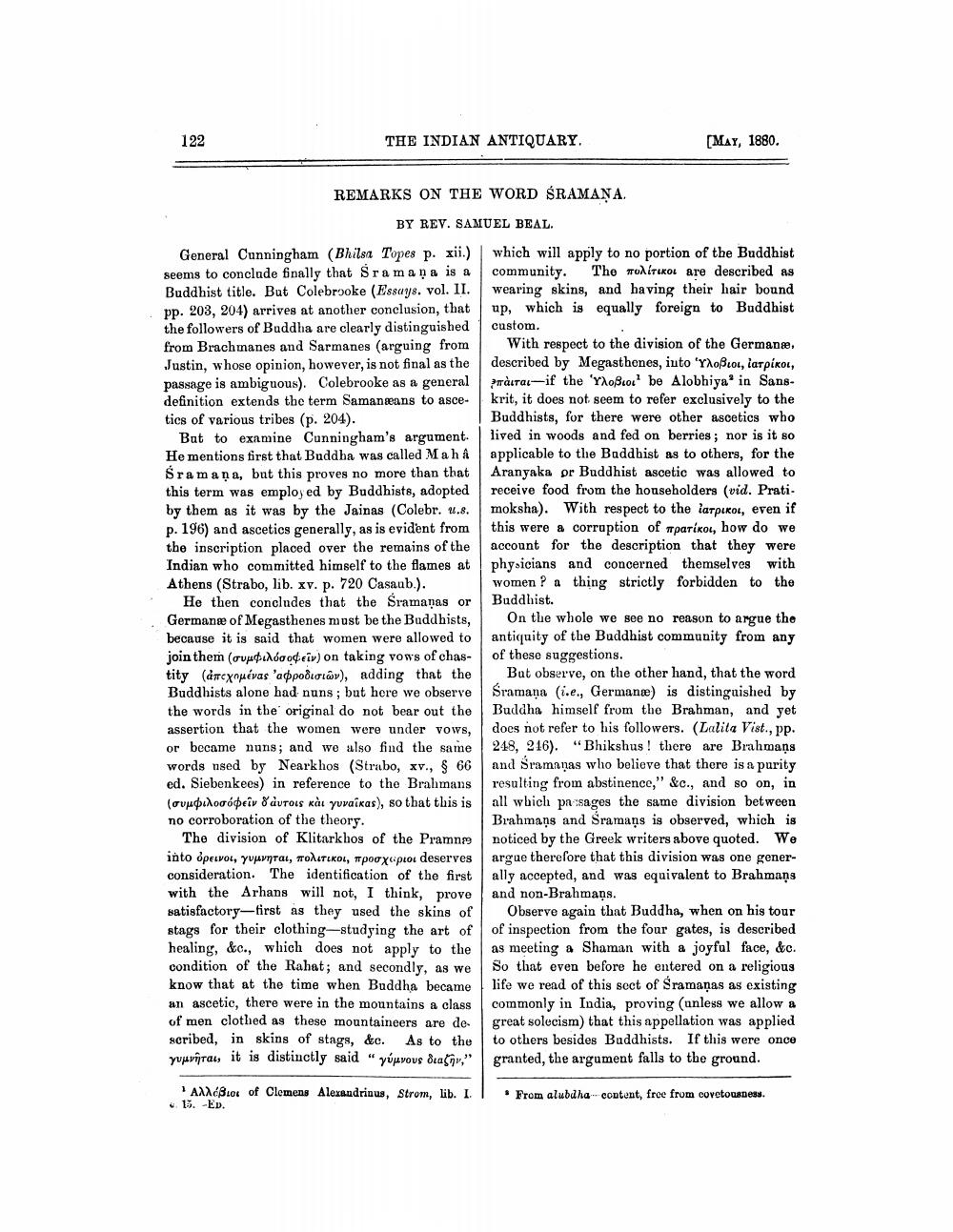________________
122
THE INDIAN ANTIQUARY.
REMARKS ON THE WORD ŚRAMANA
BY REV. SAMUEL BEAL.
General Cunningham (Bhilsa Topes p. xii.) seems to conclude finally that Sra mana is a Buddhist title. But Colebrooke (Essays. vol. II. pp. 203, 204) arrives at another conclusion, that the followers of Buddha are clearly distinguished from Brachmanes and Sarmanes (arguing from Justin, whose opinion, however, is not final as the passage is ambiguous). Colebrooke as a general definition extends the term Samanæans to ascetics of various tribes (p. 204).
But to examine Cunningham's argument. He mentions first that Buddha was called Ma hâ Śramana, but this proves no more than that this term was employed by Buddhists, adopted by them as it was by the Jainas (Colebr. u.s. p. 196) and ascetics generally, as is evident from the inscription placed over the remains of the Indian who committed himself to the flames at Athens (Strabo, lib. xv. p. 720 Casaub.).
He then concludes that the Śramaṇas or Germanæ of Megasthenes must be the Buddhists, because it is said that women were allowed to join them (outdoodeiv) on taking vows of chastity (ἀπεχημένας ’αφροδισιῶν), adding that the Buddhists alone had nuns; but here we observe the words in the original do not bear out the assertion that the women were under vows, or became nuns; and we also find the same words used by Nearkhos (Strabo, xv., § 66 ed. Siebenkees) in reference to the Brahmans (ovμpiloσópeîv 8 avтois кài yuvaikas), so that this is no corroboration of the theory.
[MAY, 1880.
1AM6B10 of Clemens Alexandrinus, Strom, lib. I. 15. -ED.
which will apply to no portion of the Buddhist community. The πολίτικοι are described as wearing skins, and having their hair bound up, which is equally foreign to Buddhist custom.
With respect to the division of the Germanæ, described by Megasthenes, into 'Yoẞto, larpikol, prairai-if the 'Yoßto be Alobhiya in Sanskrit, it does not seem to refer exclusively to the Buddhists, for there were other ascetics who lived in woods and fed on berries; nor is it so applicable to the Buddhist as to others, for the Aranyaka or Buddhist ascetic was allowed to receive food from the householders (vid. Prati moksha). With respect to the larpiko, even if this were a corruption of pariko, how do we account for the description that they were physicians and concerned themselves with women? a thing strictly forbidden to the Buddhist.
On the whole we see no reason to argue the antiquity of the Buddhist community from any of these suggestions.
But observe, on the other hand, that the word Śramana (i.e., German) is distinguished by Buddha himself from the Brahman, and yet does not refer to his followers. (Lalita Vist., pp. 248, 216). "Bhikshus! there are Brahmans and Sramanas who believe that there is a purity resulting from abstinence," &c., and so on, in all which passages the same division between Brahmans and Śramans is observed, which is noticed by the Greek writers above quoted. We argue therefore that this division was one generally accepted, and was equivalent to Brahmans and non-Brahmans.
|
The division of Klitarkhos of the Pramne into όρεινοι, γυμνηται, πολιτικοι, προσχώριοι deserves consideration. The identification of the first with the Arhans will not, I think, prove satisfactory-first as they used the skins of Observe again that Buddha, when on his tour stags for their clothing-studying the art of of inspection from the four gates, is described healing, &c., which does not apply to the as meeting a Shaman with a joyful face, &c. condition of the Rahat; and secondly, as we So that even before he entered on a religious know that at the time when Buddha became life we read of this sect of Śramanas as existing an ascetic, there were in the mountains a class commonly in India, proving (unless we allow a of men clothed as these mountaineers are de- great solecism) that this appellation was applied scribed, in skins of stags, &c. As to the to others besides Buddhists. If this were once yura, it is distinctly said "yúpvous dia," granted, the argument falls to the ground.
From alubdha content, free from covetousness.




